新视野大学英语第二版第二册reading5
- 格式:docx
- 大小:376.07 KB
- 文档页数:25

新视野大学英语读写教程第二册(第二版)参考答案Unit 1 第一单元SECTION APre-reading ActivitiesTime is the same in all places, but people’s relationship with time is different from country to country. In the United States, time is a real, precious resource, and every minute counts. People here are always in a rush and under pressure. There are no short conversations or small exchanges with strangers because people think it is a waste of time. Does this sound like your country? If it does not, and if you don’t think you would like such a place, you would most likely be unhappy in the United States, where doing things quickly is seen as a skill.1. Time.2. Short conversations or small exchanges with strangers.Comprehension of the TextExerciseⅠThe exact form of the answers is open, but the general idea is:1. The attitude is that if one is not moving ahead, he is falling behind.2. Time is treated as if it were something almost real. People budget it, save it, waste it, steal it, kill it, cut it, account for it; they also charge for it. They do this because time is a precious resource.3. Everyone is in a rush — often under pressure. In the writer’s eyes, city people always appear to be burying to get where they are going, restlessly seeking attention in a store, or elbowing others as they try to complete their shopping.4. Don’t take it personally. This is because people value time highly, and they resent someone else “wasting” it beyond a certain appropriate point.5. This is because Americans generally assess and enquire about their visitors professionally rather than socially. They start talking business very quickly. Time is always ticking in their inner ear.6. Americans produce a steady flow of labor-saving devices: they communicate rapidly through faxes, phone calls or emails rather than through personal contacts.7. The impersonality of electronic communication has little or no relation to the significance of the matter at hand.8. It is taken as a sign of skillfulness or being competent to solve a problem or fulfill a job with speed in the U.S.VocabularyExercise Ⅲ1. charge2. convention3. efficient4. obtain5. competent6. assessing7. fulfill8. conducting9. consequently 10. significance Exercise Ⅳ1. behind2. at3. in4. out5. to6. to7. in8. with9. but 10. for ExerciseⅤ1. L2. C3. D4. N5. O6. A7. E8. G9. I 10. KWord BuildingExercise Ⅵ1. commitment2. attraction3. appointment4. impression5. civilization6. composition7. confusion8. congratulation9. consideration 10. explanation 11. acquisition 12. depression Exercise Ⅶ1. advisable2. desirable3. favorable4. considerable5. remarkable6. preferable7. drinkable8. acceptableStructureExercise Ⅷ1. much less can be he write English articles2. much less can he manage a big company3. much less could he carry it upstairs4. much less have I spoken to him5. much less to read a lot outside of itExercise Ⅸ1. Having meals at home can cost as little as two or three dollars, whereas eating out at a restaurant is always more expensive.2. We thought she was rather proud, whereas in fact she just very shy.3. We have never done anything for them, whereas they have done everything for us.4. Natalie prefers to stay for another week, whereas her husband prefers to leave immediately.5. Some highly praise him, whereas others put him down severely.TranslationExerciseⅩ1. She wouldn’t take a drink, much less would she stay for dinner.2. He thought I was lying to him, whereas I was telling the truth.3. How do you account for that you have been late every day this week?4. The increase in their profits is due partly to their new market strategy.5. Such measures are likely to result in the improvement of work efficiency.6. We have already poured a lot of time and energy into the project, so we have to carry on.Exercise Ⅺ1. 我认为他不会抢劫,更不用说暴力抢劫了。
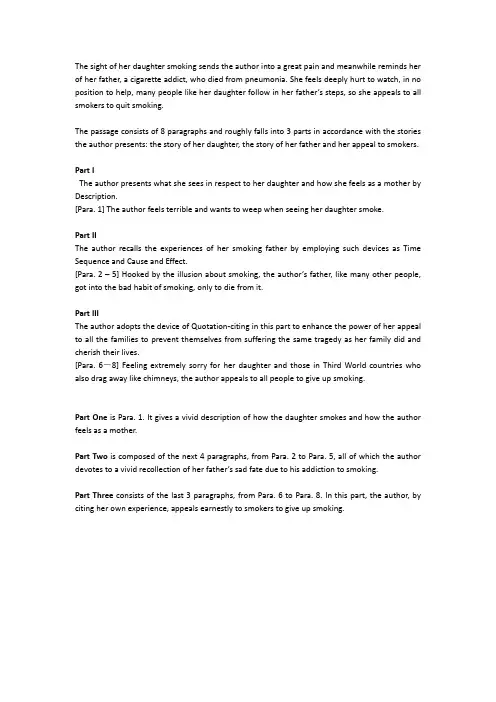
The sight of her daughter smoking sends the author into a great pain and meanwhile reminds her of her father, a cigarette addict, who died from pneumonia. She feels deeply hurt to watch, in no position to help, many people like her daughter follow in her f ather’s steps, so she appeals to all smokers to quit smoking.The passage consists of 8 paragraphs and roughly falls into 3 parts in accordance with the stories the author presents: the story of her daughter, the story of her father and her appeal to smokers.Part IThe author presents what she sees in respect to her daughter and how she feels as a mother by Description.[Para. 1] The author feels terrible and wants to weep when seeing her daughter smoke.Part IIThe author recalls the experiences of her smoking father by employing such devices as Time Sequence and Cause and Effect.[Para. 2 –5] Hooked by the illusion about smoking, the author’s father, like many other people, got into the bad habit of smoking, only to die from it.Part IIIThe author adopts the device of Quotation-citing in this part to enhance the power of her appeal to all the families to prevent themselves from suffering the same tragedy as her family did and cherish their lives.[Para. 6-8] Feeling extremely sorry for her daughter and those in Third World countries who also drag away like chimneys, the author appeals to all people to give up smoking.Part One is Para. 1. It gives a vivid description of how the daughter smokes and how the author feels as a mother.Part Two is composed of the next 4 paragraphs, from Para. 2 to Para. 5, all of which the author devotes to a vivid recollection of her father’s sad fate due to his addiction to smoking.Part Three consists of the last 3 paragraphs, from Para. 6 to Para. 8. In this part, the author, by citing her own experience, appeals earnestly to smokers to give up smoking.。
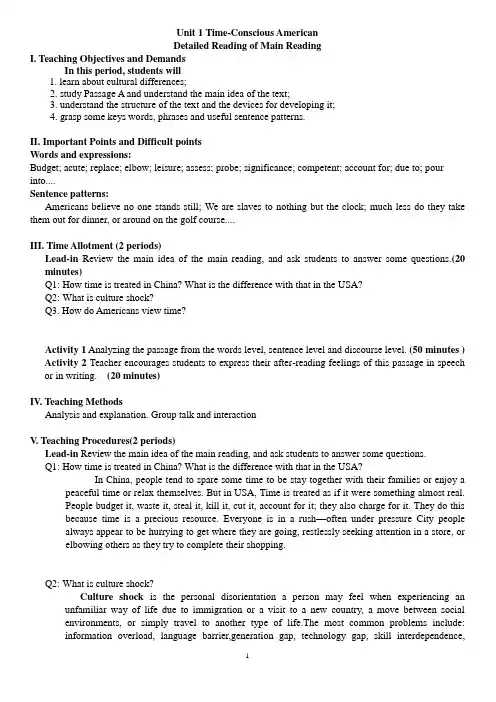
Unit 1 Time-Conscious AmericanDetailed Reading of Main ReadingI. Teaching Objectives and DemandsIn this period, students will1. learn about cultural differences;2. study Passage A and understand the main idea of the text;3. understand the structure of the text and the devices for developing it;4. grasp some keys words, phrases and useful sentence patterns.II. Important Points and Difficult pointsWords and expressions:Budget; acute; replace; elbow; leisure; assess; probe; significance; competent; account for; due to; pour into....Sentence patterns:Americans believe no one stands still; We are slaves to nothing but the clock; much less do they take them out for dinner, or around on the golf course....III. Time Allotment (2 periods)Lead-in Review the main idea of the main reading, and ask students to answer some questions.(20 minutes)Q1: How time is treated in China? What is the difference with that in the USA?Q2: What is culture shock?Q3. How do Americans view time?Activity 1 Analyzing the passage from the words level, sentence level and discourse level. (50 minutes ) Activity 2 Teacher encourages students to express their after-reading feelings of this passage in speech or in writing. (20 minutes)IV. Teaching MethodsAnalysis and explanation. Group talk and interactionV. Teaching Procedures(2 periods)Lead-in Review the main idea of the main reading, and ask students to answer some questions.Q1: How time is treated in China? What is the difference with that in the USA?In China, people tend to spare some time to be stay together with their families or enjoy a peaceful time or relax themselves. But in USA, Time is treated as if it were something almost real.People budget it, waste it, steal it, kill it, cut it, account for it; they also charge for it. They do this because time is a precious resource. Everyone is in a rush—often under pressure City people always appear to be hurrying to get where they are going, restlessly seeking attention in a store, or elbowing others as they try to complete their shopping.Q2: What is culture shock?Culture shock is the personal disorientation a person may feel when experiencing an unfamiliar way of life due to immigration or a visit to a new country, a move between social environments, or simply travel to another type of life.The most common problems include: information overload, language barrier,generation gap, technology gap, skill interdependence,formulation dependency, homesickness (cultural), infinite regress (homesickness), boredom (job dependency), response ability (cultural skill set). There is no true way to entirely prevent culture shock, as individuals in any society are personally affected by cultural contrasts differently.Q3. How do Americans view time?Time is treated by Americans as if it were something almost real. People budget it, waste it, steal it, kill it, cut it, account for it; they also charge for it. They do this because time is a precious resource.Everyone is in a rush—often under pressure City people always appear to be hurrying to get where they are going, restlessly seeking attention in a store, or elbowing others as they try to complete their shopping.Activity 1 Analyzing the passage from the words level, sentense level and discourse level.Background informationCultural differences: Students and teachers need to be aware that the ethnocentric attitudes ofwriters are precisely the way cultural conflict is encouraged. Why is understanding a culturealways the others’ responsibility? Is it not possible that each culture could be made awa re ofdifferent conventions? Both sides must work at rising above cultural differences and be willing tocompromise… and, in both cases, most likely neither side has access to the cultural conventionsof the other so blaming is not the answer.Language Points:Paragraph 1:1. Americans believe no one stands still. (Para. 1)Meaning: Americans believe no one keeps motionless; everyone moves.Here "stand" means "keep or stay in a particular position or state". In this sense, "stand" is followed by adjectives. More examples:The room stands idle. 这房间闲置着。
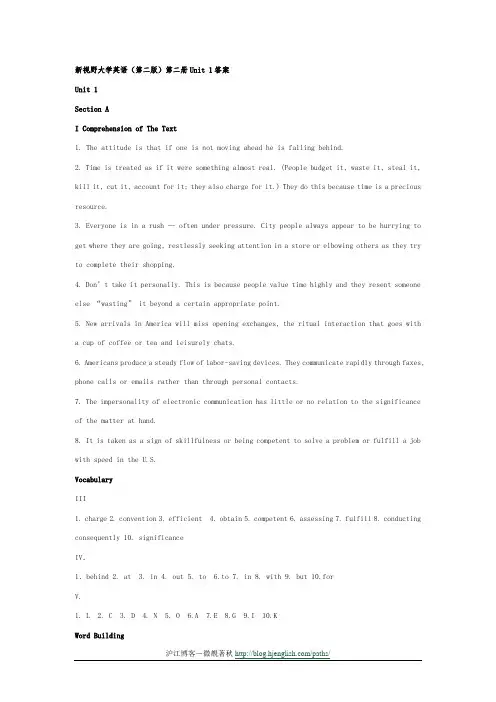
新视野大学英语(第二版)第二册Unit 1答案Unit 1Section AI Comprehension of The Text1. The attitude is that if one is not moving ahead he is falling behind.2. Time is treated as if it were something almost real. (People budget it, waste it, steal it, kill it, cut it, account for it; they also charge for it.) They do this because time is a precious resource.3. Everyone is in a rush — often under pressure. City people always appear to be hurrying to get where they are going, restlessly seeking attention in a store or elbowing others as they try to complete their shopping.4. Don’t take it personally. This is because people value time highly and they resent someone else “wasting” it beyond a certain appropriate point.5. New arrivals in America will miss opening exchanges, the ritual interaction that goes witha cup of coffee or tea and leisurely chats.6. Americans produce a steady flow of labor-saving devices. They communicate rapidly through faxes, phone calls or emails rather than through personal contacts.7. The impersonality of electronic communication has little or no relation to the significance of the matter at hand.8. It is taken as a sign of skillfulness or being competent to solve a problem or fulfill a job with speed in the U.S.VocabularyIII1. charge2. convention3. efficient4. obtain5. competent6. assessing7. fulfill8. conducting consequently 10. significanceIV.1.behind 2. at 3. in 4. out 5. to 6.to 7. in 8. with 9. but 10.forV.1. L2. C3. D4. N5. O6.A7.E8.G9.I 10.KWord BuildingVI1. commitment2. attraction3. appointment4. impression5. civilization6. composition7. confusion8. congratulation9. consideration 10. explanation 11. acquisition 12. depressionVII.desirable favorable considerable acceptabledrinkable advisable remarkable preferable1. advisable2. desirable3. favorable4. considerable5. remarkable6. preferable7. drinkable8. acceptableStructureVIII1. much less can he write English articles2. much less can he manage a big company3. much less could he carry it upstairs4. much less have I spoken to him5. much less to read a lot outside of itIX1. Having meals at home can cost as little as two or three dollars, whereas eating out at a restaurant is always more expensive.2. We thought she was rather proud, whereas in fact she was just very shy.3. We have never done anything for them, whereas they have done so much for us.4. Natalie prefers to stay for another week, whereas her husband prefers to leave immediately.5. Some praise him highly, whereas others put him down severelyTranslationX.1. She wouldn’t take a drink, much less would she stay for dinner.2. He thought I was lying to him, whereas I was telling the truth.3. How do you account for the fact that you have been late every day this week?4. The increase in their profits is due partly to their new market strategy.5. Such measures are likely to result in the improvement of work efficiency.6. We have already poured a lot of time and energy into the project, so we have to carry on. XI1. 我认为他不会抢劫,更不用说暴力抢劫了。
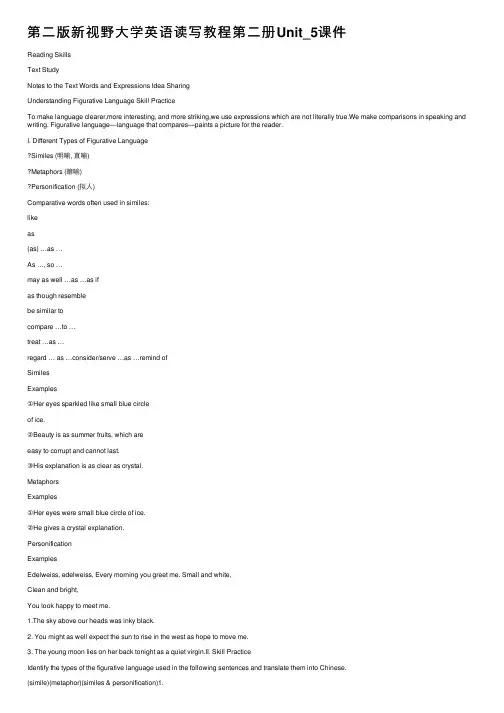
第⼆版新视野⼤学英语读写教程第⼆册Unit_5课件Reading SkillsText StudyNotes to the Text Words and Expressions Idea SharingUnderstanding Figurative Language Skill PracticeTo make language clearer,more interesting, and more striking,we use expressions which are not literally true.We make comparisons in speaking and writing. Figurative language—language that compares—paints a picture for the reader.I. Different Types of Figurative LanguageSimiles (明喻, 直喻)Metaphors (暗喻)Personification (拟⼈)Comparative words often used in similes:likeas(as) …as …As …, so …may as well …as …as ifas though resemblebe similar tocompare …to …treat …as …regard … as …consider/serve …as …remind ofSimilesExamples①Her eyes sparkled like small blue circleof ice.②Beauty is as summer fruits, which areeasy to corrupt and cannot last.③His explanation is as clear as crystal.MetaphorsExamples①Her eyes were small blue circle of ice.②He gives a crystal explanation.PersonificationExamplesEdelweiss, edelweiss, Every morning you greet me. Small and white,Clean and bright,You look happy to meet me.1.The sky above our heads was inky black.2. You might as well expect the sun to rise in the west as hope to move me.3. The young moon lies on her back tonight as a quiet virgin.II. Skill PracticeIdentify the types of the figurative language used in the following sentences and translate them into Chinese.(simile)(metaphor)(similes & personification)1.我们头顶的天如墨汁般漆⿊。
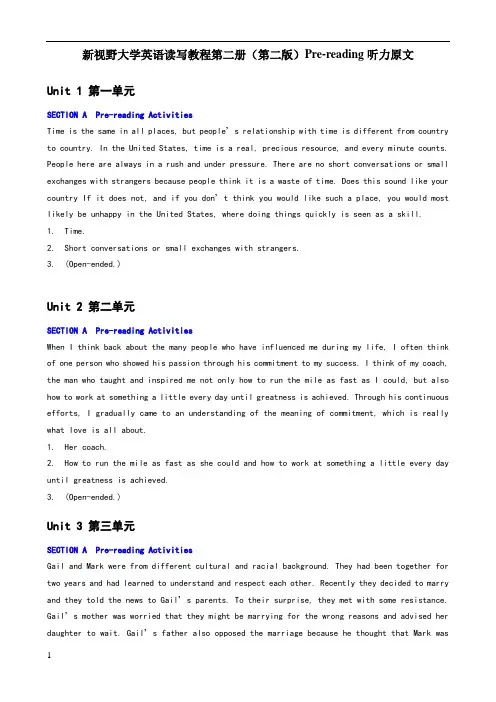
新视野大学英语读写教程第二册(第二版)Pre-reading听力原文Unit 1 第一单元SECTION A Pre-reading ActivitiesTime is the same in all places, but people’s relationship with time is different from country to country. In the United States, time is a real, precious resource, and every minute counts. People here are always in a rush and under pressure. There are no short conversations or small exchanges with strangers because people think it is a waste of time. Does this sound like your country If it does not, and if you don’t think you w ould like such a place, you would most likely be unhappy in the United States, where doing things quickly is seen as a skill.1. Time.2. Short conversations or small exchanges with strangers.3. (Open-ended.)Unit 2 第二单元SECTION A Pre-reading ActivitiesWhen I think back about the many people who have influenced me during my life, I often think of one person who showed his passion through his commitment to my success. I think of my coach, the man who taught and inspired me not only how to run the mile as fast as I could, but also how to work at something a little every day until greatness is achieved. Through his continuous efforts, I gradually came to an understanding of the meaning of commitment, which is really what love is all about.1. Her coach.2. How to run the mile as fast as she could and how to work at something a little every day until greatness is achieved.3. (Open-ended.)Unit 3 第三单元SECTION A Pre-reading ActivitiesGail and Mark were from different cultural and racial background. They had been together for two years and had learned to understand and respect each other. Recently they decided to marry and they told the news to Gail’s parents. To their surprise, they met with some resistance. Gail’s mother was worried that they might be mar rying for the wrong reasons and advised her daughter to wait. Gail’s father also opposed the marriage because he thought that Mark wasmarrying his daughter so that he could remain in the United States. Such concerns are understandable. After all, marriage across nations may have its problem of one kind or another.1. Gail’s mother was worried that they might be marrying for the wrong reason.2. Mark wanted to marry Gail so that he could remain in the United States.3. (Open-ended.)Unit 4 第四单元SECTION A Pre-reading ActivitiesI wrote a story about love, and I hope you like it. The story is about a young soldier who is waiting to see a woman he has fallen in love with. I suppose it’s a lot like my other stories in that it has a happy ending. You might laugh at me for writing stories that are so sweet. But, you see, I am a deep believer in love, and I am hopeful about everyone finding it. Without love, I really don’t know what the purpose of living would be.4. He is waiting to see a woman he has fallen in love with.5. A happy ending.6. (Open-ended.)Unit 5第五单元SECTION A Pre-reading ActivitiesToday, I want to talk about the historic opportunity we now have to protect our children from an even more deadly threat: smoking. Smoking kills more people every day than AIDS, alcohol, car accidents, murders, drugs and fires combined. Nearly 90% percent of those smokers lit their first cigarette before they turned 18. In the past few years we’ve worked to stop our children from smoking before they start, to reduce their access to tobacco products, and to restrict tobacco companies from advertising to young people. If we do these, we’ll cut teen smoking by almost half over the next five years.1. Before they turned 18.2. To reduce children’s access to tobacco pro ducts, and to restrict tobacco companies from advertising to your people.3. ( Open-ended)自由作答,陈述各自的观点.Unit 6 第六单元SECTION A Pre-reading ActivitiesPre-reading ActivitiesThere are various reasons for our final decision on what name to give to a baby. For some it may simply because they come across a name that they feel is “it”. But for most people it may be a process of careful selection based on meaning, tradition, or parents’ wishes for their child. Whatever the naming method, a given name follows the child throughout his or her life. How can parents decide on a name that will satisfy them Consider the following: First, consider the area the child will grow up in when selecting a name. Second, choose a name based on some personal meaning so when th e child asks why they’re named so, the parents will have a reasonable explanation. Finally, before deciding on a name, get opinions of people around! Chances are, if your friends and family members look shocked when you share your name selection, your child will probably be horrified as well.1.Meaning, tradition, or parents’ wishes for their child.2. Three. Get opinions of people around.3. (Open-ended.)Unit 7 第七单元SECTION A Pre-reading ActivitiesStress can kill you. Being tense can damage your heart, so it is wise to take charge of your life and realize you cannot control everything. But you can control stress which is caused by fear, uncertainty, doubt, and lack of control. Anger may also be the root of this stress, especially for hard-working professional women and people with no goals in life. To relax and take control of your life, try the NICE factors: new, interesting, challenging experiences. And follow Ben Franklin’s example by writing down the major goals you want to achieve in your life. For the problems over which you have no control, you have to learn to go with the flow. can be caused by fear, uncertainty, doubt, lack of control, and anger..2. The NICE factors are new, interesting, challenging experiences.3. (open-ended.)Unit 8 第八单元SECTION A Pre-reading ActivitiesWhat is life about We work hard everyday to make more money, to gain power and recognition. We neglect our health, time with our family, the surrounding beauty and the hobbies we love. One day when we look back, we w ill realize that we don’t really need that much. We then willrealize how much we have missed in life! Work definitely is not the whole of life. Work is meant to keep us living so that we enjoy the beauty and pleasures of life.Life is a balance of work and play, family and personal time. Happiness is the meaning and the purpose of life, the aim of human existence. So, live a balanced lifestyle and enjoy life!health, time with our family, the surrounding beauty and the hobbies we love.2. Happiness.3. (open-ended.)Unit 9 第九单元SECTION A Pre-reading ActivitiesI wasn’t the brightest kid in my graduating class. I didn’t even attend a famous school. What I did have, though, was a supportive family, and with their help, I was able to become one of the top lawyers in the state of Florida and then a Florida State Supreme Court Justice. And you know what It wasn’t as hard as you may think. It started with a clear set of rules: always get up early, always work hard, always do things honestly, always try to improve on the day before and never give up. When I was younger, I didn’t always remember the rules myself, so my father had to remind me. After a while, though, the rules became habit and everything else sort of fell into place.1. He owed his success to his supportive family.2. The rules were: always get up early, always work hard, always do things honestly, always try to improve on the day before, and never give up.3. (Open-end.) 开放性问题,可按自己的想法回答。
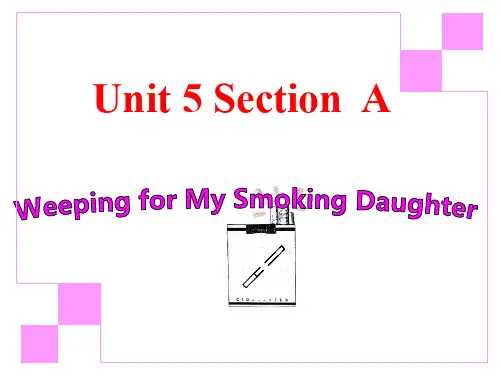
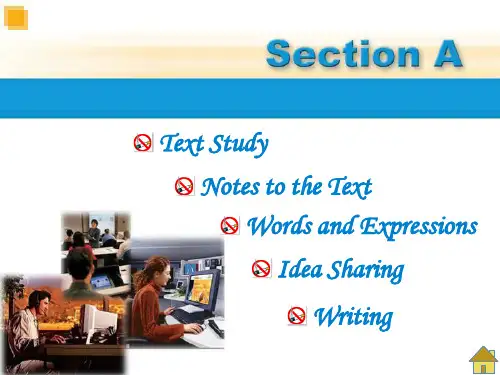
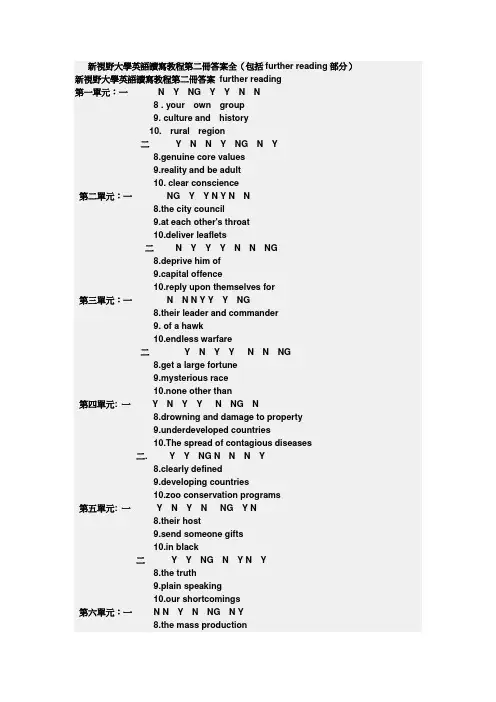
新視野大學英語讀寫教程第二冊答案全(包括further reading部分)新視野大學英語讀寫教程第二冊答案further reading第一單元:一N Y NG Y Y N N8 . your own group9. culture and history10. rural region二Y N N Y NG N Y8.genuine core values9.reality and be adult10. clear conscience第二單元:一NG Y Y N Y N N8.the city council9.at each other's throat10.deliver leaflets二N Y Y Y N N NG8.deprive him of9.capital offence10.reply upon themselves for第三單元:一N N N Y Y Y NG8.their leader and commander9. of a hawk10.endless warfare二Y N Y Y N N NG8.get a large fortune9.mysterious race10.none other than第四單元: 一Y N Y Y N NG N8.drowning and damage to property9.underdeveloped countries10.The spread of contagious diseases二. Y Y NG N N N Y8.clearly defined9.developing countries10.zoo conservation programs第五單元: 一Y N Y N NG Y N8.their host9.send someone gifts10.in black二Y Y NG N Y N Y8.the truth9.plain speaking10.our shortcomings第六單元:一N N Y N NG N Y8.the mass production9.the cocoa press10.1765二N Y N Y Y N NG8.still poor9.by all regions10.in Asia第七單元:一N N Y N NG Y Y8.one likes9.the most lasting pleasure10.a capacity二N N Y N NG Y N8.closer to the equator9.middle or eastern10.12 to 18 months第八單元:一Y Y Y N N NG N8.Eastern Europe9.psychological and social10.a low level二N Y N NG N Y Y8.the power of perseverance9.something that will10.accomplish their dreams第九單元:一Y N N Y N Y NG8.Tolerance9.the work and the cost10.keeping the connections strong二Y N Y Y N N NG8.one third9.glaciers and ice caps10.polluting water第十單元: 一Y Y N Y NG N Y8.unwelcome emailss and contact information10.economic gains二Y N N Y Y NG Y8.they have learned9.weakness and progress10.an honest and determined effort新视野大学英语(第二版)第二册Unit 1答案Unit 1Section AI Comprehension of The Text1. The attitude is that if one is not moving ahead he is falling behind.2. Time is treated as if it were something almost real. (People budget it, waste it, steal it, kill it, cut it, account for it; they also charge for it.) They do this because time is a precious resource.3. Everyone is in a rush — often under pressure. City people always appear to be hurrying to get where they are going, restlessly seeking attention in a store or elbowing others as they try to complete their shopping.4. Don’t take it personally. This is because people value time highly and they resent someone else ―wasting‖ it beyond a certain appropriate point.5. New arrivals in America will miss opening exchanges, the ritual interaction that goes witha cup of coffee or tea and leisurely chats.6. Americans produce a steady flow of labor-saving devices. They communicate rapidly through faxes, phone calls or emails rather than through personal contacts.7. The impersonality of electronic communication has little or no relation to the significance of the matter at hand.8. It is taken as a sign of skillfulness or being competent to solve a problem or fulfill a job with speed in the U.S.VocabularyIII1. charge2. convention3. efficient4. obtain5. competent6. assessing7. fulfill8. conducting consequently 10. significanceIV.1.behind 2. at 3. in 4. out 5. to 6.to 7. in 8. with 9. but 10.forV.1. L2. C3. D4. N5. O6.A7.E8.G9.I 10.KWord BuildingVI1. commitment2. attraction3. appointment4. impression5. civilization6. composition7. confusion8. congratulation9. consideration 10. explanation 11. acquisition 12. depressionVII.desirable favorable considerable acceptabledrinkable advisable remarkable preferable1. advisable2. desirable3. favorable4. considerable5. remarkable6. preferable7. drinkable8. acceptableStructureVIII1. much less can he write English articles2. much less can he manage a big company3. much less could he carry it upstairs4. much less have I spoken to him5. much less to read a lot outside of itIX1. Having meals at home can cost as little as two or three dollars, whereas eating out at a restaurant is always more expensive.2. We thought she was rather proud, whereas in fact she was just very shy.3. We have never done anything for them, whereas they have done so much for us.4. Natalie prefers to stay for another week, whereas her husband prefers to leave immediately.5. Some praise him highly, whereas others put him down severelyTranslationX.1. She wouldn’t take a drink, much less would she stay for dinner.2. He thought I was lying to him, whereas I was telling the truth.3. How do you account for the fact that you have been late every day this week?4. The increase in their profits is due partly to their new market strategy.5. Such measures are likely to result in the improvement of work efficiency.6. We have already poured a lot of time and energy into the project, so we have to carry on. XI1. 我认为他不会抢劫,更不用说暴力抢劫了。
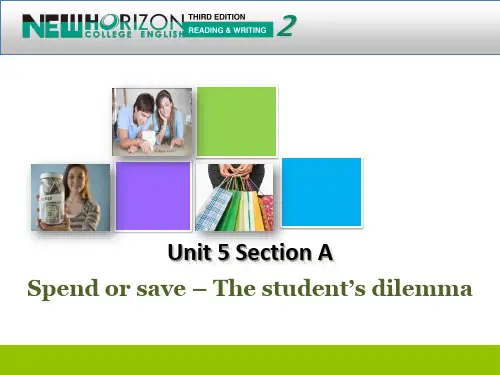
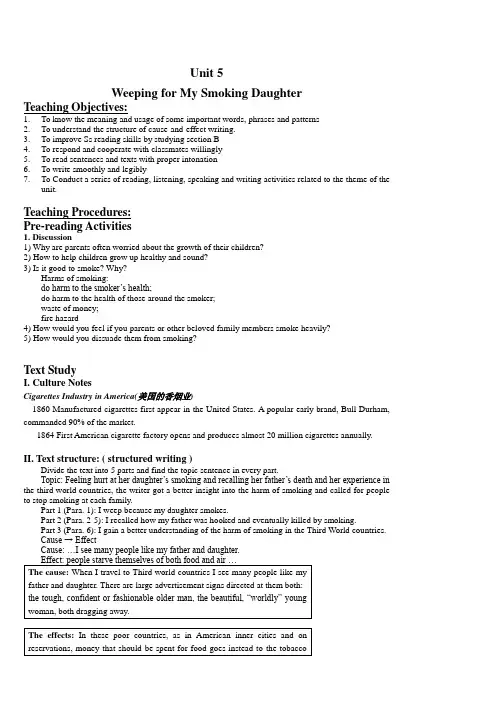
Unit 5Weeping for My Smoking DaughterTeaching Objectives:1.To know the meaning and usage of some important words, phrases and patterns2.To understand the structure of cause-and-effect writing.3.To improve Ss reading skills by studying section B4.To respond and cooperate with classmates willingly5.To read sentences and texts with proper intonation6.To write smoothly and legibly7.To Conduct a series of reading, listening, speaking and writing activities related to the theme of theunit.Teaching Procedures:Pre-reading Activities1.Discussion1) Why are parents often worried about the growth of their children?2) How to help children grow up healthy and sound?3) Is it good to smoke? Why?Harms of smoking:do harm to the smoker’s health;do harm to the health of those around the smoker;waste of money;fire hazard4) How would you feel if you parents or other beloved family members smoke heavily?5) How would you dissuade them from smoking?Text StudyI. Culture NotesCigarettes Industry in America(美国的香烟业)1860 Manufactured cigarettes first appear in the United States. A popular early brand, Bull Durham, commanded 90% of the market.1864 First American cigarette factory opens and produces almost 20 million cigarettes annually. II. Text structure: ( structured writing )Divide the text into 5 parts and find the topic sentence in every part.Topic: Feeling hurt at her daughter’s smoking and recalling her father’s death and her experience in the third world countries, the writer got a better insight into the harm of smoking and called for people to stop smoking at each family.Part 1 (Para. 1): I weep because my daughter smokes.Part 2 (Para. 2-5): I recalled how my father was hooked and eventually killed by smoking.Part 3 (Para. 6): I gain a better understanding of the harm of smoking in the Third World countries.Cause → EffectCause: …I see many people like my father and daughter.Part 5 (Para. 8): I hope people would stop smoking at each family.III. ReproductionPair work: a mini-play show.One student acts as a worried mother and the other as a smoking daughter. You are supposed to argue over the smoking problem.A sample beginningA conversation between a worried mother(M) and a smoking daughter(D):M: Dear, I found Camels on your desk again. I need to talk to you.D: Just take it easy, Mum. You see the heroes and beautiful women in movies? They looked so fashionable and cool when blowing smoke rings.IV. New Words1.weep: v. ⑴cry 哭泣,流(泪)(2)(of a wound) produce liquid (伤口)渗出液体weep over/foreg: When he heard the news, he broke down and wept.他听到这个消息是控制不住感情,哭了起来.eg: The wound is weeping.伤口在出血weepy: adj. 要哭的,泪汪汪的;(故事、电影等)使人伤心的辨析:weep意为哭泣,强调无声的饮泣,多用于书面语。
新视野⼤学英语读写教程第⼆版第⼆册课⽂翻译【1-10单元全】UNIT 5 SECTION A我为⼥⼉抽烟哭泣我的⼥⼉会抽烟。
她做家庭作业时,脚搁在前⾯的长凳上,计算机嗒嗒地跳出⼏何题的答案。
我看着那包已抽了⼀半、她随意扔在紧靠⼿边处的骆驼牌⾹烟。
我拿起⾹烟,⾛到厨房⾥去仔细察看,那⾥的光线好⼀点——谢天谢地,那是有过滤嘴的。
可我⼼⾥却感到⼗分难过。
我想哭。
事实上,站在炉⼦旁边, 我确实哭过。
我⼿⾥捏着⼀⽀雪⽩雪⽩的⾹烟,制作得⾮常精致。
那可是会致我⼥⼉于死地的东西啊。
当她抽?万宝路?及?运动员?牌⾹烟时,我硬起⼼肠, 不让⾃⼰感到难过。
我认识的⼈当中没有哪个抽过这两种牌⼦的⾹烟。
她不知道我⽗亲、也就是她外公⽣前抽的就是骆驼牌⾹烟。
但是在他开始抽机制卷烟之前——那时他很年轻、也很穷,但眼睛炯炯有神——他抽的是⽤阿尔伯特亲王牌烟丝⾃⼰⼿⼯卷制的⾹烟。
我还记得那鲜红的烟丝罐头,上⾯有⼀张维多利亚⼥王的丈夫阿尔伯特亲王⾝穿⿊⾊燕尾服、⼿拿⼀⽀⼿杖的图⽚。
到40年代末、50年代初,我的家乡佐治亚州的伊腾顿镇上已没有⼈再⾃⼰⼿⼯制作卷烟了(⽽且⼏乎没有⼥⼈抽烟)。
烟草业,再加上好莱坞电影——影⽚中的男⼥主⾓都是⽼烟⿁——把像我⽗亲那样的⼈完完全全争取了过去, 他们⽆可救药地抽烟上了瘾。
然⽽我⽗亲看上去从来就没有像阿尔伯特亲王那样时髦。
他还是⼀个贫穷、过于肥胖、为养活⼀⼤家⼈⽽拼命⼲活的男⼈。
他浑⾝漆⿊,嘴⾥却总叼着⼀⽀雪⽩的⾹烟。
我记不清⽗亲是什么时候开始咳嗽的, 也许开始时并不明显, 他早晨⼀下床点燃第⼀⽀⾹烟时才有点微咳。
到我16岁, 也就是我⼥⼉现在这般年龄时,他⼀呼吸就呼哧呼哧的,让⼈感到不安;他上楼时每⾛三、四级楼梯就得停下来休息⼀会⼉。
他常常⼀连咳上⼀个来⼩时。
肺病把我⽗亲折磨得虚弱不堪, ⼀个严冬,他死于被叫做?穷⼈的朋友?的疾病—肺炎。
他咳嗽了这么多年,我想他的肺部已没有什么完好的地⽅了。
去世前⼏年,他的呼吸已经很虚弱了,他总得倚靠着某个东西。
My dau ghter smok es. 我女儿抽烟Whi le sh e isdoing herhomew ork,her f eet o n the benc h infront of h er an d her calc ulato r cl ickin g out answ ers t o her geom etry prob lems, I am look ing a t the half-empt y pac kageof C amels toss ed ca reles sly c loseat ha nd. 她做作业时,脚搁在前面的长凳上,计算器嗒嗒地跳出几何题的答案。
我看着那包已抽了一半、她随意扔在手边的“骆驼”牌香烟。
I pick them up,takethemintothe k itche n, wh ere t he li ght i s bet ter,and s tudythem—they're f ilter ed ,for w hichI amgrate ful .我拿起香烟,走到厨房里去仔细察看,那里的光线好一点──谢天谢地,香烟是有过滤嘴的。
M y hea rt fe els t errib le. 我心里十分难过。
I want to w eep.我想哭。
Infact, I do weea lit tle,stand ing t hereby th e sto ve ho lding oneof th e ins trume nts,sowh ite,so pr ecise ly ro lled, that coul d cau se my daug hter's dea th. 事实上,我确实哭过。
Unit 1Time-Conscious AmericansAmericans believe no one stands still. If you are not moving ahead, you are falling behind. This attitude results in a nation of people committed to researching, experimenting and exploring. Time is one of the two elements that Americans save carefully, the other being labor."We are slaves to nothing but the clock," it has been said. Time is treated as if it were something almost real. We budget it, save it, waste it, steal it, kill it, cut it, account for it; we also charge for it. It is a precious resource. Many people have a rather acute sense of the shortness of each lifetime. Once the sands have run out of a person's hourglass, they cannot be replaced. We want every minute to count.A foreigner's first impression of the US is likely to be that everyone is in a rush—often under pressure. City people always appear to be hurrying to get where they are going, restlessly seeking attention in a store, or elbowing others as they try to complete their shopping. Racing through daytime meals is part of the pace of life in this country. Working time is considered precious. Others in public eating-places are waiting for you to finish so they, too, can be served and get back to work within the time allowed. You also find drivers will be abrupt and people will push past you. You will miss smiles, brief conversations, and small exchanges with strangers. Don't take it personally. This is because people value time highly, and they resent someone else "wasting" it beyond a certain appropriate point.Many new arrivals in the States will miss the opening exchanges of a business call, for example. They will miss the ritual interaction that goes with a welcoming cup of tea or coffee that may be a convention in their own country. They may miss leisurely business chats in a restaurant or coffee house. Normally, Americans do not assess their visitors in such relaxed surroundings over extended small talk; much less do they take them out for dinner, or around on the golf course while they develop a sense of trust. Since we generally assess and probe professionally rather than socially, we start talking business very quickly. Time is, therefore, always ticking in our inner ear.Consequently, we work hard at the task of saving time. We produce a steady flow of labor-saving devices; we communicate rapidly through faxes, phone calls or emails rather than through personal contacts, which though pleasant, take longer—especially given our traffic-filled streets. We, therefore, save most personal visiting for after-work hours or for social weekend gatherings.To us the impersonality of electronic communication has little or no relation to the significance of the matter at hand. In some countries no major business is conducted without eye contact, requiring face-to-face conversation. In America, too, a final agreement will normally be signed in person. However, people are meeting increasingly on television screens, conducting "teleconferences" to settle problems not only in this country but also—by satellite—internationally.The US is definitely a telephone country. Almost everyone uses the telephone to conduct business, to chat with friends, to make or break social appointments, to say "Thank you", to shop and to obtain all kinds of information. Telephones save the feet and endless amounts of time. This is due partly to the fact that the telephone service is superb here, whereas the postal service is less efficient.Some new arrivals will come from cultures where it is considered impolite to work too quickly. Unless a certain amount of time is allowed to elapse, it seems in their eyes as if the task being considered were insignificant, not worthy of proper respect. Assignments are, consequently, given added weight by the passage of time. In the US, however, it is taken as a sign of skillfulness or being competent to solve a problem, or fulfill a job successfully, with speed. Usually, the more important a task is, the more capital, energy, and attention will be poured into it in order to "get it moving".美国人认为没有人能停止不前。
Unit1她连水都不愿喝一口,更别提留下来吃饭了。
wouldn'ttakeadrink,muchlesswouldshestayfordinner.他认为我在对他说谎,但实际上我讲的是实话。
thoughtIwaslyingtohim,whereasIwastellingthetruth.这个星期你每天都迟到,对此你怎么解释?doyouaccountforthefactthatyouhavebeenlateeverydaythisweek?他们利润增长的局部原因是采用了新的市场策略。
increaseintheirprofitsisduepartlytotheirnewmarketstrategy.这样的措施很可能会带来工作效率的提高。
measuresarelikelytoresultintheimprovementofworkefficiency.我们已经在这个工程上投入了大量的时间和精力,所以我们只能继续。
havealreadypouredalotoftimeandenergyintotheproject,sowehavetocarryon.Unit2尽管她是家里的独生女,她父母也从不溺爱她。
thefactthatsheistheonlychildinherfamily,sheisneverbabiedbyherparents.迈克没来参加昨晚的聚会,也没给我打做任何解释。
didn'tcometothepartylastnight,nordidhecallmetogiveanexplanation.坐在他旁边的那个人确实发表过一些小说,但绝不是什么大作家。
personsittingnexttohimdidpublishsomenovels,butheisbynomeansagreatwriter.他对足球不感兴趣,也从不关心谁输谁赢。
hasnointerestinfootballandisindifferenttowhowinsorloses.经理需要一个可以信赖的助手,在他外出时,由助手负责处理问题。
Part 1 Word Dictation(每小题:0.5 分)Directions: Listen and write down the words you hear. You are going to listen to the recording twice. During the first time, write the word that you hear. Check your answers as you listen the second time.1.2.3.4.5.6.7.8.9.10.11.12.13.14.15.16.17.18.19.20.Part 2 Understanding Long Conversations(每小题:1 分)Directions: In this section you'll hear a long conversation or conversations. Listen carefully and choose the best answer to the questions you hear.Questions 1 to 5 are based on the same passage or dialog.1.A. In the middle of the semester.B. At the beginning of the exam.C. At the end of the semester.D. During a rock concert.2.A. To a rock and mineral show.B. To an opera at the concert hall.C. To a movie at the student center.D. To a rock concert.3.A. He has time to go to the Student Center.B. The woman doesn't have much money.C. The woman agreed to pay for the food.D. He likes to pay for his friends' tickets.4.A. Her ticket only.B. Their vacation.C. Her dinner only.D. Their dinner.5.A. The man will pay for two tickets.B. They will not go to the concert together.C. The woman has a part time job.D. They don't like pop music.Questions 6 to 10 are based on the same passage or dialog. 6.A. He has been off work these days.B. He has been on a diet.C. He has been putting on weight.D. He has just got over being sick.7.A. He doesn't eat meat.B. He drinks too much.C. He does little exercise.D. He smokes a lot.8.A. He is overweight.B. He is a heavy smoker.C. He has been on a diet these days.D. He doesn't look good.9.A. He smokes too much.B. He eats too many cakes and candies.C. He likes to smoke too much.D. He often goes on diets.10.A. Give up smoking.B. Do more exercise.C. See a doctor.D. Eat more like Eric.Part 3 Understanding Passages(每小题:1 分)Directions: In this section you'll hear a passage or passages. Listen carefully and choose the best answer to the questionsyou hear.Questions 1 to 5 are based on the same passage or dialog. 1.A. Tobacco is harmful to people's health.B. The surgeon general is helpful in reducing smoking.C. Women can get breast cancer from smoking.D. Smoking is more harmful than people thought.2.A. 44,000.B. 400,400.C. 440,000.D. 4,400.3.A. 1946.B. 1964.C. 1914.D. 1944.4.A. US$75 billion.B. US$65 million.C. US$75 million.D. US$175 billion.5.A. Smokers die 13 years to 14 years after nonsmokers.B. Smokers will surely die 13 years to 14 years beforenonsmokers.C. Nonsmokers are likely to live longer than smokers onaverage.D. Smoking is the cause of many serious diseases. Questions 6 to 10 are based on the same passage or dialog. 6.A. They follow a common direction.B. People get so upset in them.C. Things turn out all right in the end.D. Children are so spoiled by parents.7.A. All of the things she will give to the child.B. All of the care she will give to the child.C. All of the good things that will happen.D. All of the goods that the child will collect.8.A. The child becomes angry.B. The child becomes grateful.C. The child becomes selfish.D. The child becomes giving.9.A. They go through a process of discovery.B. They hear the truth from their parents.C. They learn to be more sensitive to others.D. They grow through natural fluctuations.10.A. By understanding that their relationship changes.B. By rewarding one another when they act well.C. By improving their expectations of one another.D. By showing each other that they are on the same side.Questions 11 to 15 are based on the same passage or dialog.11.A. Their parents' honeymoon.B. A long-anticipated trip to Hawaii.C. Their parents' wedding anniversary.D. The family reunion.12.A. To make a special metal box.B. To put away a dollar each day.C. To do their own repairs on the house.D. To have a big party to celebrate their wedding anniversary.13.A. Teaching.B. Repairing.C. Accounting.D. Raising five children.14.A. Hawaii.B. A savings account.C. A metal box.D. Their children's room.15.A. Flights to Hawaii.B. Ten day's hotel room.C. Plenty of money to spend.D. A visit to Cancun.Part 4 Vocabulary and Structure(每小题:1 分)Directions: Choose the best answer from the four choices marked A, B, C and D.1.Shall we request the chairman __________ our suggestionagain?A. to considerB. consideringC. considerD. considered2.Some say yes and others say no; I don't know __________ tofollow.A. whetherB. whatC. whomD. how3.An explosion is a sudden increase in amount __________.A. rapid burning causes itB. to be caused by rapid burningC. causing its burning to be rapidD. caused by rapid burning4.We forgave her anger because we knew that her father'sillness had put her under great _________.A. shelterB. crisisC. stressD. nervousness5.He never _________ to read the news but turned at once tothe crossword puzzle on the last page.A. worriedB. noticedC. painedD. bothered6.Since we can't hear you at the back of the hall, you'll have to__________ your voice.A. improveB. increaseC. raiseD. open7.The price they offered for my old car was so low that I_________ it down.A. broughtB. turnedC. calledD. refused8.The noise of the traffic _________ Paul from his work.A. preventedB. distractedC. angeredD. upset9.People appreciate _____________ with him because he hasa good sense of humor.A. workingB. to have workedC. to workD. having worked10.Inquiries _____________ the condition of the patients may bemade personally or by telephone.A. revealingB. concerningC. affectingD. following11.Nobody knows how long and how seriously the shakiness ofbig businesses will _________ down the economy.A. putB. settleC. dragD. knock12.I tried very hard to persuade him to join our group but I metwith a flat _____________ .A. acceptB. agreeC. refusalD. decline13.She had clearly no _____________ of doing any work,although she was very well paid.A. tendencyB. foundationC. intentionD. belonging14.Many students found the book _____________; it providedthem with a large amount of information on the subject.A. informativeB. confusingC. distractingD. amusing15.I just managed to _____________ a quick breath before I waspulled under the water by the passing boats.A. loadB. gainC. takeD. escape16.The government's strong action demonstrated its_____________ to end the rebellion.A. energyB. resistanceC. courageD. determination17.Mr. Sanders has been asked to _____________ the nextmeeting of the committee.A. manageB. chairC. listenD. think18.I could not persuade him to accept it, _____________ makehim see the importance of it.A. if only I could notB. or I could notC. not more than I couldD. nor could I19.__________ for my illness I would have lent him a helpinghand.A. Not beingB. Without beingC. Had it not beenD. Not having been20.Not that John doesn't want to help you, _____________ it'sbeyond his power.A. but thatB. for thatC. and thatD. in that21.It is politely requested by the hotel management that radios_____________ after 11 o'clock at night.A. were not playedB. not be playedC. not to playD. didn't play22.To be frank, I'd rather you _____________ in the case.A. will not be involvedB. not to be involvedC. not involvedD. were not involved23.Careful surveys have indicated that as many as fifty percent ofpatients do not take drugs _____________ directed.A. likeB. soC. whichD. as24.It's reported that by the end of this month the output of goodsfrom the factory _______________ by about 10%.A. will have risenB. will be risingC. has risenD. has been rising25.I felt somewhat disappointed and was about to leave,_____________ something occurred which attracted myattention.A. unlessB. untilC. whenD. while26.The little man was _____________ one meter fifty in height.A. almost more thanB. nearly more thanC. hardly more thanD. as much as27._________ that my head had cleared, my brain was alsobeginning to work much better.A. ForB. SinceC. NowD. DespitePart 5 Cloze (with Options)(每小题:1 分)Directions: Read the following passage carefully and choose the best answer from the choices.Questions 1 to 20 are based on the following passage.I never could really talk to my father. I always felt pretty 1.2.18. When I returned home to visit, I found my mother andfather had just gotten a 3.visit to his place 4.feelings. But his place was dark and cold and 5.generally 6.When I was little, my father would take me fishing all the time.It seemed like I 7.lakes. To me, at the age of eight, there was nothing wrongwith being like my dad. I still 8.being outdoors, free and away from everyone else. But as Imoved into my teens, it became 9.my dad had a drinking problem. As our family's financialsituation became worse, 10.When I was very young, my dad was able to 11.job. As I grew older, he became less functional and 12.talks turned into 13.became very angry. He was 14.being able to 15.16.17.alcohol. When he got home from whatever job he was in the18.didn't get in a fight with my mom he would usually 19.he made it to the dinner table to eat with us, I knew that before the meal was over, he would be very angry with 20.me.Part 6 Skimming and Scanning (Multiple Choice+Blank Filling)(每小题:1 分)Directions: Read the following passage or passages and then answer the questions. For the first 7 questions in each passage, choose the best answer from the four choices marked A, B, C and D. For the remaining 3 questions in the same passage, complete the sentences with the information given in the passage.Questions 1 to 10 are based on the same passage or dialog. Are You Reading as Many Books as You Would Like?Do you read as much as you'd like, or as many as you'd like of the books you're interested in? Are you aware that the time spent on today's reading prevents you from reading something else? Life is one of choices?make sure your choices take you in the direction you wish to go.My biggest recommendation (建议) to increase your reading rate is to attend a rapid reading course (sometimes called speed reading), but the single most important element is the on-going practice.If you want to try a few techniques on your own, here are a few key pointers, but you really need to attend a course to be pushed to significantly higher levels of competency, because only an external person can push you past the comfort zone of your eyes, your brain, and your current beliefs about your abilities.Some Rapid-reading Keys:Read with purpose. Don't read things you won't remember, and don't waste time reading things that won't further you in any way. However, many people read mindlessly, just because it's there!You should start with the end in mind.Have an expectation of success. See yourself reading at great speed. Fill your mind with a positive expectation of great deeds. Feel and imagine the power of the rapid flow of information into your mind. And hear the rapid flow of words just pouring into your brain.Preview and review the book. You can do it by scanning contents and other information at the front, as well as the back. Sit upright and hold the book at a comfortable position. Have good overhead light, fresh air, plenty of water, and a comfortable temperature.Use a visual guide. You may usually use your finger, or sometimes two fingers, which depends on the size of the print. This is where the training by an instructor is really useful (they won't let you get away with bad habits, and they push you beyond your comfort level). One of the key elements of rapid reading is to use our finger at a very fast rate, running it down the page. We don't need to read every word in order to comprehend (理解) and keep the information. All we need is a large amount of text, and the sense is gathered at lightening speed.Speed training. Go as fast as your hand can turn the pages, and don't worry that there seems to be practically no comprehension at this stage. The key is to extend the eye's capacity to absorb, and to strengthen your mind's belief that it can be done. Two hands are needed. With one hand run a finger down the page as fast as you can. At first you'll notice an occasional word or phrase will jump out at you, but not much else. That's fine—comprehension is not the goal at this stage. With the other hand, turn the pages as fast as you can go.Set a daily target for yourself—it might be to race through a thick book that you're interested to read. It might be to practice for a specified amount of time.Practice, practice, and practice. Magazines and newspapers are great to practice on. The columns (栏目) are thin, which helps you go even faster.Comprehension. You may think you're not absorbing much, but try this test. Choose a book you want to read. Each time you pick it up to read in your old style, first do the rapid run described above. You'll notice when you come to read in your slow way that in factyou already know, and can remember having seen, most of the key concepts. We call this a conscious convincer. Your subconscious needs reassurance (安心) that nothing is being lost, and that you have absorbed the information you need. Coupled with the rapid "preview", if you do wish to read slower, do it with a highlighter in your hand. Your ability to keep the material will be greatly enhanced, for you will have visited the information several times.You may still wish to read at a slower speed for enjoyment, or because you need to really absorb every word of an author for study purposes, but if every day you practice this technique, suddenly you'll find you really are reading and absorbing at a much faster rate.1.What can we know about life? ________________A. Life is about reading.B. Life is about choices.C. Life is about wishes.D. Life is about directions.2.What is the most important element in speed reading?________________A. Your comfort zone.B. A level of competency.C. Practice that doesn't stop.D. One's reading rate.3.From the fourth paragraph we know when we read,________________.A. we should start reading with a purpose in mindB. we should take time reading something which you won't rememberC. we should read something near at hand because it is convenientD. we should start at the end of the book to know the purpose4.How can we preview and review the book?________________A. Sit upright and hold the book at a comfortable position.B. Have good overhead light and fresh air.C. Have plenty of water, and a comfortable temperature.D. Glance at contents and other information at the front andthe back.5.When we use our finger as a visual guide in rapid reading, it'svery crucial that ________________.A. we take our time and have a full comprehensionB. we run our finger down the page very fastC. we read every word on the page to keep the informationD. we gather the sense of the passage light-heartedly6.In speed reading, the finger of one hand runs down the page,and the other hand ________________.A. turns the pages quicklyB. guides the eyes to absorbC. runs down the page tooD. marks the occasional word or phrase7.We should ________________.A. read newspapers and magazines every dayB. finish reading a thick book every dayC. plan a daily objective of reading for ourselvesD. read newspaper columns daily8.Reading a book quickly and then checking yourcomprehension by reading slowly is called9.We will greatly strengthen our ability to keep the information,10.You might want to read slowly for study purposes orPart 7 Reading Comprehension (Multiple Choice)(每小题:1 分)Directions: Read the following passages carefully and choose the best answer from the four choices marked A, B, C and D.Questions 1 to 5 are based on the same passage or dialog. Ours is a big world, and full of many different people. People with many varying (不同的) points of view are often running up against others who have different opinions. Those of us who smoke are just one group of many. Recently, the activism (采取行动) ofnon-smokers has reminded us of the need to be considerate (体谅的) of others when we smoke in public.But, please! Enough is enough! We should like to remindnon-smokers that being polite is a two-way street. If you politely request that someone not smoke you are more likely to receive an agreeable response than if you give an ugly look and say something unkind. If you speak directly to someone, you are more likely to get what you want than if you complain to the management.Many of us have been smoking for so long that we sometimes forget that others are not used to the smell of burning tobacco. We' re human, and like everyone else, we occasionally offend unknowingly. But most of us are open to friendly suggestions and comments, and quite willing to change our behavior to accommodate others.Smokers are people, too. We laugh and cry. We have hopes, dreams, and aspirations. We have children, mothers, and pets. Weeat our hamburgers (汉堡包) with everything on them and give respect to the flag at Fourth of July picnics. We hope you'll remember that the next time a smoker light up in public.1.The purpose of the first paragraph is ______.A. to inform the reader of the bigness of the worldB. to declare that the author belongs to the group of smokersC. to tell non-smokers that smokers will be considerateD. to reveal the author's reason for writing this essay2.What does the second sentence in the second paragraphimply?A. We should go on two different roads.B. We have different ways of doing things.C. Being polite to each other is a mutual thing.D. We can smoke and sometimes we will not smoke.3.According to the author, how can you get an agreeableresponse from smokers if you don't feel like someone smoking beside you?A. Complain to his boss.B. Tell him directly that you hate smokers.C. Keep from complaining but do something to suggest yourfeelings.D. Tell him politely that you are not used to smoke.4.According to the author, why do some smokers smoke inpublic?A. Because they cannot stop from smoking.B. Because they forget that others do not like the smellcigarettes.C. Because they are humans and they cannot avoid offendingpeople.D. Because there is no law against it.5.How does the author try to persuade the reader?A. He uses reasons.B. He appeals to people's feelings.C. He gives examples in his argument.D. He simply states his opinion.Questions 6 to 10 are based on the same passage or dialog.In the United States, it is not normal to telephone someone very early in the morning. If you telephone him early in the day, while he is shaving or having breakfast, the time of the call shows that the matter is very important and requires immediate attention. The same meaning is attached to telephone calls made after 11:00 p. m. If someone receives a call during sleeping hours, he assumes it's a matter of life and death. The time chosen for the call communicates its importance.In social life, time plays a very important role. In the US guests tend to feel they are not highly regarded if the invitation (邀请) to a dinner party is extended only three or four days before the party date. But this is not true in all countries. In other areas of the world it may be considered foolish to make an appointment too far in advance because plans which are made for a date more than a week away tend to be forgotten.The meaning of time is different in different parts of the world. Thus, misunderstandings arise between people from cultures that treat time differently. To be on time is valued highly in American life, for example. If people are not on time, they may be regarded as not polite or not fully responsible. In the US no one would think of keeping a business associate waiting for an hour; it would bebad-mannered. A person who is five minutes late is expected to apologize. If he is less than five minutes late, he will say a few words of explanation, though perhaps he will not complete the sentence.6.If you telephone someone early in the day, it means___________________.A. you are expected to explain whyB. you are not kind enoughC. you want to show your concern for himD. you have a very important matter to discuss7.The expression "a matter of life and death" means__________________.A. an issue of the greatest importance and emergencyB. a very important appointmentC. a matter of whether someone should live or dieD. a strong desire to communicate8.In the US guests tend to feel they are not highly regarded_______________.A. if the invitation to a dinner party is not extended earlyenoughB. if the invitation to a dinner party is extended too far inadvanceC. if the invitation to a dinner party is not extended repeatedlyD. if the invitation to a dinner party is extended to too manypeople9.The word "misunderstanding" can be explained as____________.A. failing to attend a partyB. failing to understand correctlyC. standing in one's wayD. standing on one's own feet10.Which of the following statements is NOT true according tothe passage?A. In the US it's normal to keep someone waiting for some time.B. In the US it's not polite to keep someone waiting for an hour.C. In the US one is always expected to be on time.D. In the US one is expected to apologize if he is five minutes late。